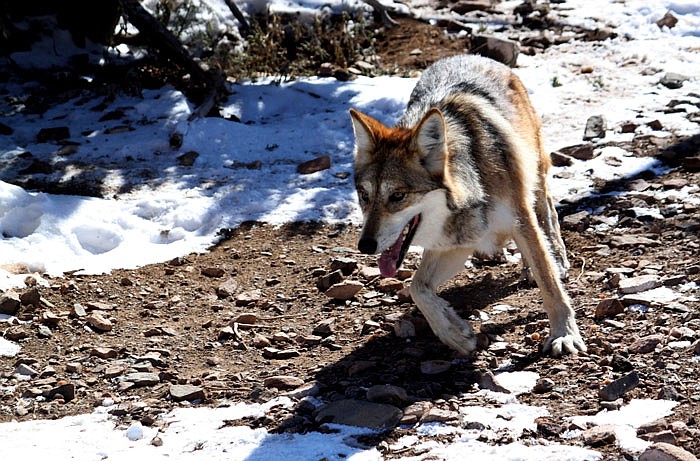DENVER (AP) - A battle over how to save endangered wolves in the Southwest moved to a federal appeals court Wednesday as judges heard arguments on whether states can block the federal government from reintroducing wildlife within their borders.
The Interior Department asked the Denver-based 10th Circuit Court of Appeals to overturn a preliminary injunction that bars the department from releasing more captive-bred Mexican gray wolves into the wild in New Mexico without that state's approval.
New Mexico has multiple complaints about the way the wolf reintroduction program is managed, and in 2015 it refused to issue a permit to the U.S. Fish and Wildlife Service - part of the Interior Department - to release more of the predators in the state. New Mexico also announced it might sue the agency.
Fish and Wildlife decided to release more wolves anyway, citing an urgent need to expand the wild population to prevent inbreeding. New Mexico officials went to court, and a federal judge in New Mexico issued an order last year blocking further releases while the dispute is resolved.
The Interior Department appealed to the 10th Circuit.
New Mexico state attorney Matthias L. Sayer told a three-judge panel of the appeals court Wednesday that the Endangered Species Act requires the Fish and Wildlife Service to cooperate with the state.
But one of the judges, Scott Matheson Jr., questioned whether New Mexico could show definitively that it would be harmed by the release of more wolves, and how much harm it would suffer.
New Mexico has also made a states' rights argument, saying states have the primary responsibility to manage wildlife. Eighteen other states filed a friend-of-the-court brief siding with New Mexico.
Interior Department lawyers argued the law allows the department to go around the state, if necessary, to save a species. The preliminary injunction against more releases "threatens the survival in the wild of a protected species," they said in written arguments.
At Wednesday's hearing, Justice Department attorney Rachel Heron also argued against the state's rights position, saying the federal government is required by law to protect the wolves.
A coalition of environmental groups, led by Defenders of Wildlife, intervened on the Interior Department's side. They argue the state's legal interpretation would wrongly give them veto power over measures to save a federally protected species.
The three judges who heard the case did not say when they would decide. Appeals court judges generally take weeks or months to issue a ruling.
Even if the court sides with the government, it's not clear whether president-elect Donald Trump's administration will continue to fight after he takes office.
It was the latest skirmish in the federal government's long and troubled effort to restore the rare wolves to part of their original range under the Endangered Species Act. It comes as the future of the law is in question, with Congress and the White House in the control of Republicans who generally see it as an impediment to jobs and economic development.
Reintroducing wolves is always contentious because they sometimes attack domestic livestock as well as game animals prized by hunters. Last year, the Interior Department's internal watchdog said the Fish and Wildlife Service had not fulfilled its obligation to remove Mexican gray wolves that preyed on pets and cattle.
The Mexican wolf program has had other problems, including multiple failed attempts to update the original 1982 recovery plan.

